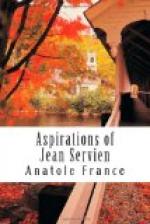“The harmony of the spheres fills the spaces of infinity, and if we hear it not, it is because, as Plato says, our ears are stopped with earth.”
Monsieur Tudesco consumed brandy-cherries in a very elegant way. Then the waiter served two dantzigs in little glass cups. Jean admired the translucent liquor dotted with golden sparkles, and Monsieur Tudesco demanded two more. Then, raising his cup on high:
“I drink to the health of Monsieur Servien, your venerable father,” he cried. “He enjoys a green and flourishing old age, at least I hope so; he is a man superior to his mechanic and mercantile condition by the benevolence of his behaviour to needy men of letters. And your respected aunt? She still knits stockings with the same zeal as of yore? At least I hope so. A lady of an austere virtue. I conjecture you are wishing to order another dantzig, my young friend.”
Jean looked about him. The dram-shop was transfigured; the casks looked enormous with their taps splendidly glittering, and seemed to stretch into infinity in a quivering, golden mist. But one object was more monstrously magnified than all the rest, and that was the Marquis Tudesco; the old man positively towered as huge as the giant of a fairy-tale, and Jean looked for him to do wonders.
Tudesco was smiling.
“You do not drink, my young friend,” he resumed. “I conjecture you are in love. Ah! love! love is at once the sweetest and the bitterest thing on earth. I too have felt my heart beat for a woman. But it is long years ago since I outlived that passion. I am now an old man crushed under adverse fortune; but in happier days there was at Rome a diva of a beauty so magnificent and a genius so enthralling that cardinals fought to the death at the door of her box; well, sir, that sublime creature I have pressed to my bosom, and I have been informed since that with her last sigh she breathed my name. I am like an old ruined temple, degraded by the passage of time and the violence of men’s hands, yet sanctified for ever by the goddess.”
This tale, whether it recalled in exaggerated terms some commonplace intrigue of his young days in Italy, or more likely was a pure fiction based on romantic episodes he had read in novels, was accepted by Jean as authentic and vastly impressive. The effect was startling, amazing. In an instant he beheld, with all the miraculous clearness of a vision, there, standing between the tables, the queen of tragedy he adored; he saw the locks braided in antique fashion, the long gold pendants drooping from either ear, the bare arms and the white face with scarlet lips. And he cried aloud:
“I too love an actress.”
He was drinking, never heeding what the liquor was; but lo! it was a philtre he swallowed that revivified his passion. Then a torrent of words rose flooding to his lips. The plays he had seen, Cinna, Bajazet, the stern beauty of Emilie, the sweet ferocity of Roxana, the sight of the actress cloaked in velvet, her face shining so pale and clear in the darkness, his longings, his hopes, his undying love, he recounted everything with cries and tears.




